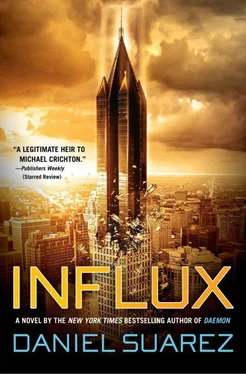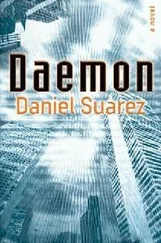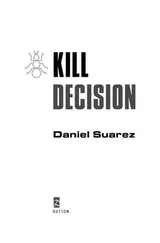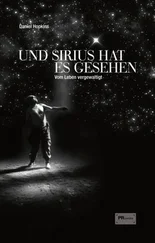“Extra dimensions?”
Hedrick ignored the question as he gestured again to the gallery. “Your gravity mirror belongs here, and you should feel honored—very honored indeed.”
“It isn’t an honor. I’d like to leave now, please.”
“We greatly admire your work, Jon. We want you to do what other researchers”—he motioned along the displays in the gallery—“like those whose work is represented here, have done. Join us. We want you to be part of the BTC family. To continue your research, but to continue it with access to technology you can only now imagine. We can open so many doors of inquiry to you. We can show you scientific wonders.”
Grady was still trying to process it all. He shook his head clear and walked farther along the gallery. At the next display he saw a hologram of cells, this time dividing and re-forming, as well as the image of a young person resembling an older person beside them. The plaque read:
Immortal DNA strand segregation—June 1986: Lee, Chao Park
He read the details. “My God…”
“Immortality is just one of the things we’ve accomplished, Jon.” Hedrick gestured down the gallery. “True artificial intelligence, quantum computing, miraculous metamaterials—and so much more. You can be part of it. You’ve earned a place among us.”
“Us?” He turned. “I want to speak with Doctor Alcot.”
“I’ve told you that’s not possible. Everyone must decide on his own—not because of what someone else decided.”
“How do I know he’s even alive?”
“Why would we harm him?”
“And why would you kidnap someone? Why would you conceal the cure for cancer? The achievement of fusion? I want to see my colleagues.”
Hedrick sighed. “You’re acting as if we’ve had no role in this. You do realize we’re the reason you received your funding? We’re the reason your research succeeded.”
Grady narrowed his eyes. “I was awarded a National Science—”
“You were awarded an NSF grant? How do you really know? And who was it that identified you from among all those candidates? From among the students in your online courses?”
“What are you talking about?”
“Very early on your mathematical solutions in online physics courses came to the attention of our AIs. You think very differently from others, Jon. Our AIs guided your path. They’re the ones who noted the unusual promise in the mathematics of your grant application. Please don’t act as if we’re intruding here. If it weren’t for us, your ideas would never have been realized. Think back on how you’ve been treated all your life. Professionally. Personally.”
Grady stared blankly at Hedrick.
“Yes, Jon. We know about your unusual way of seeing the world. But we’ve had faith in you all along, even when no one else did. You have a unique gift—a visionary way of interpreting the physical world. That’s what we search for. We’d like to learn from you. And unlike the public world, we have the ability to understand what you teach us.”
Grady stood numbly again, trying in vain to comprehend it all. His model of the known world was no longer valid.
That comforting hand on his shoulder again. Hedrick leaned close. “The ability to manipulate gravity will transform even our most advanced technologies. Instead of containing fusion reactions in a magnetic field, as with tokamak designs, we’ll be able to carry out fusion the same way stars do. We might gain a four hundred and fifty–to-one energy yield. And that’s just the beginning.”
Grady pondered this. “Not with a gravity mirror you won’t. You’d need a million times the mass of the Earth for that.”
“But that’s where you can help us, Jon. How do we create gravity—not simply reflect it? That’s the next goal. You mentioned to Professor Kulkarni that acceleration can be harnessed—redirected. That’s a promising line of research.”
“Kulkarni is one of yours, too?”
Hedrick ignored this question. “You and I both know gravity is the most powerful force in the universe. It can consume whole galaxies. Light itself. If we could create it from energy—imagine what constructs man might be capable of.”
They were walking again now, Hedrick guiding Grady to the end of the gallery and into another large office. Grady was lost in thought.
As they entered the new office, he looked up to see a young woman standing next to a conference table, along with an older, grizzled-looking man in his sixties. The guy had the demeanor and stance of an old soldier, and he wore a black uniform bearing an inscrutable rank and the BTC’s tree insignia. Grady did a double take on the woman. She was incredibly beautiful, fair complected, with short jet-black hair and lapis-lazuli-blue eyes. She wore a tailored pantsuit and crisp white blouse—normal business attire. But in fact, she was so attractive it was difficult for Grady to take his eyes off her, despite his absurd predicament.
Hedrick apparently noticed. He smiled and motioned toward the woman. “And what show-and-tell of our technology would be complete without an introduction to Alexa?”
The woman cocked her head to the side and frowned. “You always make me sound like a circus attraction.”
“Not at all.” Hedrick turned to Grady. “Alexa is one of our top bureau managers but also a biotech marvel. Her DNA includes proprietary genetic sequences developed decades ago by BTC scientists—sequences that give her longevity, intelligence, and perfect form. She is literally a product of BTC research. An experiment that led to great advances.”
Alexa sighed. “Are you finished, Graham?”
Hedrick nudged Grady. “How old do you think she is?”
Alexa rolled her eyes. “Graham, if we could just continue debriefing Mr. Grady.”
“How old, Jon? Guess.”
Grady couldn’t help but look her up and down. “I… Twenty-three.”
“Try forty-six. And that’s without gene therapy. It was her genomic sequence that led to the breakthrough in immortal DNA strand segregation and a cure for necrotic cascade back in the ’80s.” He looked admiringly at her. “What a magnificent creature.”
“I’m not a ‘creature,’ Graham.”
He laughed mildly. “Yes. Of course.”
The older man cleared his throat and spoke with weary irritation. “We’ve got a busy schedule, Mr. Director.”
“Yes, Mr. Morrison. You’re right. And as important as you are, Jon, we do need to get down to business.” Hedrick joined them at the table and offered a seat to Grady as the two BTC officials stood nearby. “We’d like you to join the BTC as a research scientist, Jon. You’ll have access to the best facilities on earth and nearly limitless funding. You’ll live more like a god than a mortal. And we can make your years long indeed.” Hedrick tapped at the glass surface of the table, and Grady’s gravity-reflection CAD plans appeared as ghostly 3D apparitions, rotating slowly in midair. “Gravity magnification—creating strong gravity fields derived purely from energy—that’s what we want your research to focus on. And you’ll have the most powerful biological and synthetic minds available to assist you.”
Grady shook his head. “I’m not joining anything. I want to see my colleagues.”
Hedrick grimaced. “Jon, we’ve been over this.”
“I have no desire to live ‘like a god’ while everyone else suffers.” He pointed to Alexa. “You’re creating a race apart when you should be sharing this technology with the world. What gives you the right to keep this all for yourselves? You have fusion , and you haven’t shared limitless clean energy with a starving world?”
Hedrick nodded slowly to himself, digesting this. But Alexa walked around the table, approaching Grady with a stern look on her lovely face. “A starving world?”
Читать дальше












